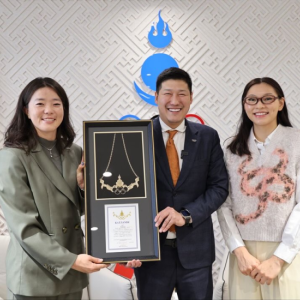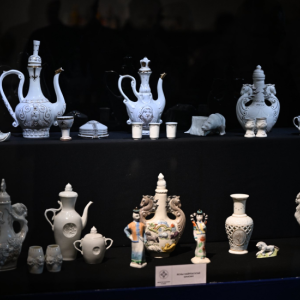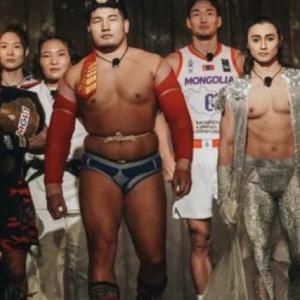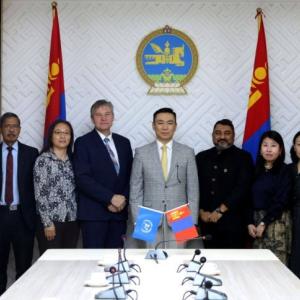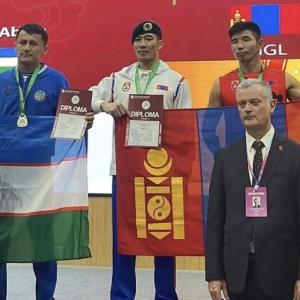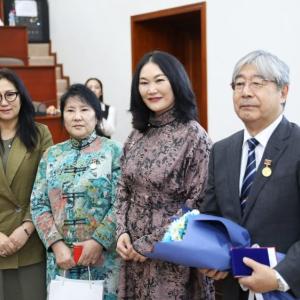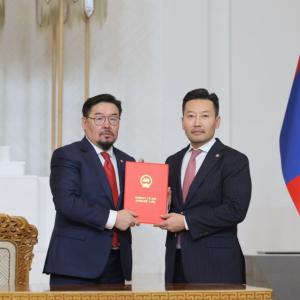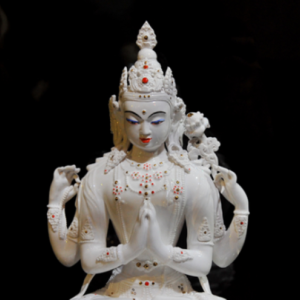Tengger Cavalry blows a new wind in the rock scene
The Mongol Messenger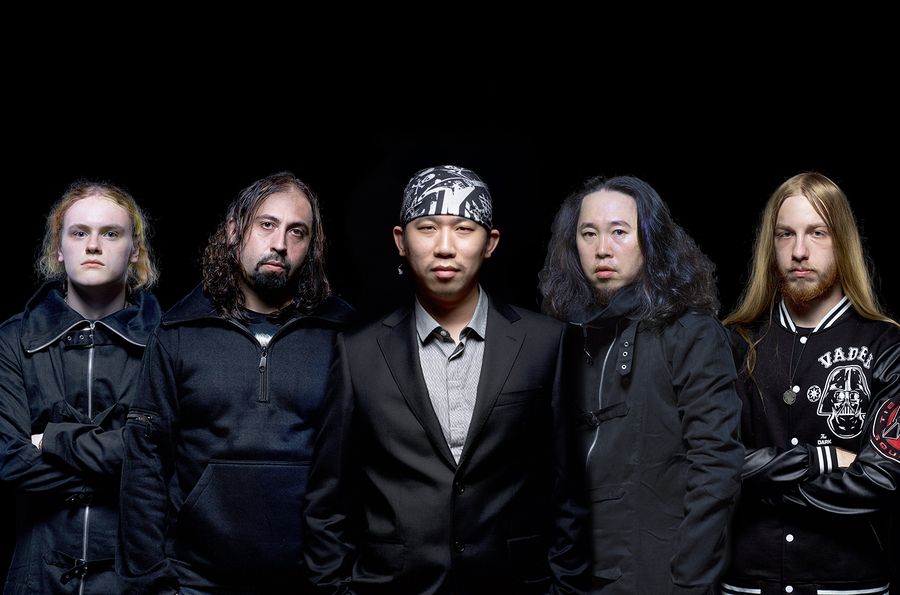
US-based folk metal band promotes nomadic music
Although the name Tengger Cavalry might not ring a bell to those who don’t have rock songs on their playlist, it must be definitely familiar to metal fans that are constantly on the lookout for new and good music. The New York-based nomadic folk metal band Tengger Cavalry’s music surely has both qualities.
The band has blessed the international rock music scene with a new genre and a new sound that is nomadic folk metal. “International rock music mostly sounds western and not a lot of people are aware of Asian musical influence at all. Now, people are starting to take an interest in Asian music”, shares Nature G, leader and founder of the group in an online interview with the Mongol Messenger.
Referred to as nomadic folk metal by Billboard and CNN, genre specific Tengger Cavalry has introduced to rock music scene is particularly fresh in the ears of the western world. Similar music under the folk rock genre has been long heard and appreciated in eastern cultures. Yet, Tengger Cavalry’s nomadic folk metal records redefine ‘cool’ music, taking folk rock to a whole new level and animating warrior spirits for any listener that enjoy them, regardless of their cultural roots.
“We used to call ourselves a Mongolian Folk Metal band, yet we changed it to nomadic folk metal because there are many absolutely amazing Mongolian rock bands like Altan Urag and we don’t want to take credit from the rock scene in Mongolia”, says Nature G. “We respect them a lot”.
More importantly, Tengger Cavalry is also influenced by Siberian shamanic folk, Native American folk and Central Asian folk. “Somehow these cultures connect to nomadic lifestyle, so we figure it might be better to define our genre as nomadic folk metal”, he adds. “I think, the term ‘nomadic folk metal’ gives a better idea about folk influence we have in our music to international audiences”.
Founded as a solo project in 2010 in Beijing by Ganganbaigal or Nature G (guitar, throat singing and Morin Khuur), Tengger Cavalry has expanded to be a 5-member band made of Alex Abayev (bass), Josh Schrifris (drum), Robert McLaughlin (Igil, Shanz and throat singing) and Uljmuren De (Morin Khuur). “We have close and far ancestral relations to Mongolia, Central Asia and Russia”, says Nature G.
At first listen, those who have never heard traditional Mongolian music will wonder about the resonant tune Tengger Cavalry’s records share, and the answer is the Morin Khuur, a traditional two-stringed instrument from Mongolia which represents the vital significance to local folk culture, alongside other phenomena such as throat singing and long singing.
“The Morin Khuur represents the most important and emotional musical parts in our music, usually the chorus of a song, and sometimes the intense rhythmic sections too”, Nature G explains. The songwriter agrees that Tengger Cavalry isn’t Tengger Cavalry without the Morin Khuur which he describes as “truly an amazing instrument from Mongolia that has a long honorable history for hundreds of years and can carry both epic melodies and an intense/fast pace rhythm”. “We also use a lot of Dombra from Kazakhstan and Native American flute. All of them are important to our sound”, he points out.

With their music video ‘Mountain Side’, Tengger Cavalry won a silver medal at the 2016 Global Music Awards. The band’s unique music can be enjoyed from their 4 studio albums, Sunesu Cavalry (2012), Blood Sacrifice Shaman (2015), Hymn of the Earth (2016) and Cavalry in Thousands (2016), and thankfully, a new Tengger Cavalry album is on the way. “Warriors keep fighting” is how Nature G defines the band’s fifth studio album ‘Die On My Ride’ to be released on June 2, following their signing with Las Vegas based label M-Theory Audio last March.
In addition to performing khoomei (throat singing) and playing multiple native instruments, frontman Nature G composes the amazing songs Tengger Cavalry play. He says he is mostly inspired by his experiences of staying on grassland, riding horses and helping native Mongolian nomadic herders, and shamanic rituals in local areas. “I take inspiration from the spirit of peaceful nomadic life that stays strong in tough weather situations”. “I believe in shamanism”, the composer says. According to him, the name Tengger Cavalry means a warrior that believes and defends shamanic beliefs.
Nature G says the love and respect for Mongolian culture and nomadic life on the grassland drove him to embark on a musical journey. “Especially now that industries and factories are dominating our lifestyle and nomadic life is being challenged and affected, it is important to bring people’s attention back to the importance of nomadic culture”, he notes. “I think, the journey is more about the self-reflecting and learning process in Mongolian culture and music. It’s very important for me to keep learning and deepening my knowledge about the authenticity of the culture”, he also shares.
Born and raised in Beijing in the 80s, Nature G knows of his distant Mongolian ancestry. “I am always aware of the huge and profound influence of Mongolian culture in Northern Asia generally”. He explains, “Mongolian culture means bravery and peacefulness to me. Bravery and strength come from the warrior part in history, and peacefulness and kindness come from nomadic life and worshiping nature”. He added that it is only his own understanding so far and he is still learning. “I think Mongolian music is very nature-oriented with the spirit of respecting nature and all living creatures”, he commented.
He learned khoomei and Morin Khuur when he was around 19 from his ‘amazing’ teachers from the Inner Mongolian Autonomous Region of the People’s Republic of China. He has seen performances of throat singers from Mongolia and says he loves the throat singing style in Mongolia. “Throat singing is very hard to practice, but the overtone resonances sound very powerful and strong. I don’t think throat singing styles differ that much in Mongolia and Inner Mongolia”.
“I would absolutely like to visit Mongolia sometime. I have been to Inner Mongolia many times and would love to go to the countryside in Mongolia”, he shared with the Mongol Messenger. Let us hope that Nature G’s wish comes true in the near future, allowing Tengger Cavalry’s fans in Mongolia to enjoy their live performance.
Although the name Tengger Cavalry might not ring a bell to those who don’t have rock songs on their playlist, it must be definitely familiar to metal fans that are constantly on the lookout for new and good music. The New York-based nomadic folk metal band Tengger Cavalry’s music surely has both qualities.
The band has blessed the international rock music scene with a new genre and a new sound that is nomadic folk metal. “International rock music mostly sounds western and not a lot of people are aware of Asian musical influence at all. Now, people are starting to take an interest in Asian music”, shares Nature G, leader and founder of the group in an online interview with the Mongol Messenger.
Referred to as nomadic folk metal by Billboard and CNN, genre specific Tengger Cavalry has introduced to rock music scene is particularly fresh in the ears of the western world. Similar music under the folk rock genre has been long heard and appreciated in eastern cultures. Yet, Tengger Cavalry’s nomadic folk metal records redefine ‘cool’ music, taking folk rock to a whole new level and animating warrior spirits for any listener that enjoy them, regardless of their cultural roots.
“We used to call ourselves a Mongolian Folk Metal band, yet we changed it to nomadic folk metal because there are many absolutely amazing Mongolian rock bands like Altan Urag and we don’t want to take credit from the rock scene in Mongolia”, says Nature G. “We respect them a lot”.
More importantly, Tengger Cavalry is also influenced by Siberian shamanic folk, Native American folk and Central Asian folk. “Somehow these cultures connect to nomadic lifestyle, so we figure it might be better to define our genre as nomadic folk metal”, he adds. “I think, the term ‘nomadic folk metal’ gives a better idea about folk influence we have in our music to international audiences”.
Founded as a solo project in 2010 in Beijing by Ganganbaigal or Nature G (guitar, throat singing and Morin Khuur), Tengger Cavalry has expanded to be a 5-member band made of Alex Abayev (bass), Josh Schrifris (drum), Robert McLaughlin (Igil, Shanz and throat singing) and Uljmuren De (Morin Khuur). “We have close and far ancestral relations to Mongolia, Central Asia and Russia”, says Nature G.
At first listen, those who have never heard traditional Mongolian music will wonder about the resonant tune Tengger Cavalry’s records share, and the answer is the Morin Khuur, a traditional two-stringed instrument from Mongolia which represents the vital significance to local folk culture, alongside other phenomena such as throat singing and long singing.
“The Morin Khuur represents the most important and emotional musical parts in our music, usually the chorus of a song, and sometimes the intense rhythmic sections too”, Nature G explains. The songwriter agrees that Tengger Cavalry isn’t Tengger Cavalry without the Morin Khuur which he describes as “truly an amazing instrument from Mongolia that has a long honorable history for hundreds of years and can carry both epic melodies and an intense/fast pace rhythm”. “We also use a lot of Dombra from Kazakhstan and Native American flute. All of them are important to our sound”, he points out.

With their music video ‘Mountain Side’, Tengger Cavalry won a silver medal at the 2016 Global Music Awards. The band’s unique music can be enjoyed from their 4 studio albums, Sunesu Cavalry (2012), Blood Sacrifice Shaman (2015), Hymn of the Earth (2016) and Cavalry in Thousands (2016), and thankfully, a new Tengger Cavalry album is on the way. “Warriors keep fighting” is how Nature G defines the band’s fifth studio album ‘Die On My Ride’ to be released on June 2, following their signing with Las Vegas based label M-Theory Audio last March.
In addition to performing khoomei (throat singing) and playing multiple native instruments, frontman Nature G composes the amazing songs Tengger Cavalry play. He says he is mostly inspired by his experiences of staying on grassland, riding horses and helping native Mongolian nomadic herders, and shamanic rituals in local areas. “I take inspiration from the spirit of peaceful nomadic life that stays strong in tough weather situations”. “I believe in shamanism”, the composer says. According to him, the name Tengger Cavalry means a warrior that believes and defends shamanic beliefs.
Nature G says the love and respect for Mongolian culture and nomadic life on the grassland drove him to embark on a musical journey. “Especially now that industries and factories are dominating our lifestyle and nomadic life is being challenged and affected, it is important to bring people’s attention back to the importance of nomadic culture”, he notes. “I think, the journey is more about the self-reflecting and learning process in Mongolian culture and music. It’s very important for me to keep learning and deepening my knowledge about the authenticity of the culture”, he also shares.
Born and raised in Beijing in the 80s, Nature G knows of his distant Mongolian ancestry. “I am always aware of the huge and profound influence of Mongolian culture in Northern Asia generally”. He explains, “Mongolian culture means bravery and peacefulness to me. Bravery and strength come from the warrior part in history, and peacefulness and kindness come from nomadic life and worshiping nature”. He added that it is only his own understanding so far and he is still learning. “I think Mongolian music is very nature-oriented with the spirit of respecting nature and all living creatures”, he commented.
He learned khoomei and Morin Khuur when he was around 19 from his ‘amazing’ teachers from the Inner Mongolian Autonomous Region of the People’s Republic of China. He has seen performances of throat singers from Mongolia and says he loves the throat singing style in Mongolia. “Throat singing is very hard to practice, but the overtone resonances sound very powerful and strong. I don’t think throat singing styles differ that much in Mongolia and Inner Mongolia”.
“I would absolutely like to visit Mongolia sometime. I have been to Inner Mongolia many times and would love to go to the countryside in Mongolia”, he shared with the Mongol Messenger. Let us hope that Nature G’s wish comes true in the near future, allowing Tengger Cavalry’s fans in Mongolia to enjoy their live performance.
Kh.Aminaa
The article first appeared in the Mongol Messenger's issue No. 20 for May 19, 2017.
 Ulaanbaatar
Ulaanbaatar





